When Trump Hands You a Laptop Ban, Qatar Airways Makes Lemonade
If you are considering booking travel or signing up for a new credit card please click here. Both support LiveAndLetsFly.com.
If you haven’t followed us on Facebook or Instagram, add us today.
Review of Laptop Ban origin
According to reports, US Intelligence recovered information that suggested terrorists had plans to use laptop computers in the passenger cabins of aircraft to inflict harm and successfully detonated one in February of 2016. Initially, the laptop ban was for a number of Middle Eastern countries however the ban is now potentially spreading to Europe. The UK has placed a ban on the use of laptops from some of the same countries, though the US ban affects far more countries than that of the UK.
The ban itself, sometimes referred to as an electronics ban, prohibits passengers from traveling with their laptops in the cabin of the aircraft and includes anything larger than a large mobile phone. This includes Kindles, iPads, even cameras from traveling in the cabin with a passenger.
A timeline of one year was suggested, though the liquid ban is still with us more than a decade later.
Impressions From Travelers
During a recent flight from Doha to Los Angeles, I had the opportunity to witness Qatar Airways approach to the ban and reactions of travelers both from the US and abroad. One traveler based in Qatar had suggested that their perception of the ban was that it was more of a business decision (to penalize the Middle East Three) than a response to a true terroristic threat. Another traveler, an American, rolled their eyes in disgust as they prepared to surrender an iPad ahead of a 15 hour and 27 minute flight.
The most disappointing reaction I personally witnessed was the complete indifference from a pair of Indian travelers who believed that this was just another requirement for entering an already difficult country. Had the agent asked for a blood sample they might have given one in the moments prior to boarding.
Process Explanation
Qatar Airways outlines aspects of the process to customers on their website:
Complimentary laptop will be available for Business Class passengers to use while travelling on all US-bound flights from next week and can be collected after boarding. Customers will be able to download their work on to a USB before stepping on board to pick up where they left-off. Qatar Airways is offering a special service at the gate for all passengers, whereby any electronic items prohibited by the new ban will be collected and securely packaged. These will be tagged, loaded as check-in baggage and returned safely to the customer on arrival to the US.
What is not clear from that statement is what happens at the point of surrender, nor when you will receive your equipment back. For example, the statement is made that laptops will be returned to customers upon arriving in the US, but does this work like a gate check? Would there be a huge line in the jetway?
At the gate in Doha, I was told that my laptop will be available for pickup through the normal checked bag process with an attendant waiting to distribute them back to customers.
Process In-Action
When departing to US destinations (which already have additional security measures and secured boarding areas), a desk was set to the side and attended by a pair of staff members who will wrap and pack your items in front of you.
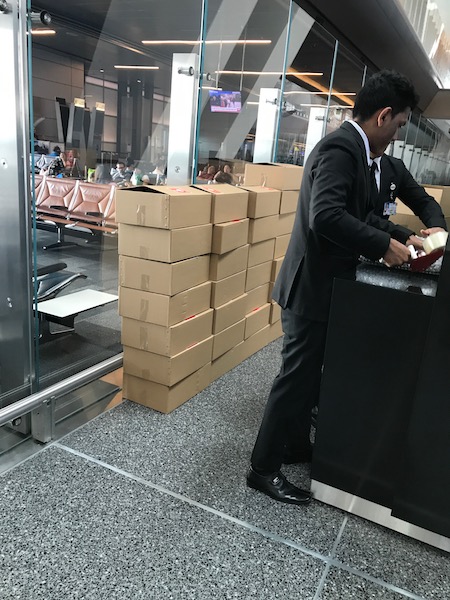
First, the staff members ensure the devices are switched off even after asking. They opened my laptop and pressed the space bar to make sure it was fully powered down and not just in a sleep or hibernate mode.
Then one staff member fills out paperwork about who the items belong to (seat number was on the package) among other information. The other staff member begins to stack your devices if you have more than one, and wrap them in bubble wrap. The gentleman that wrapped mine was careful but quick and the process was transparent from start to finish.
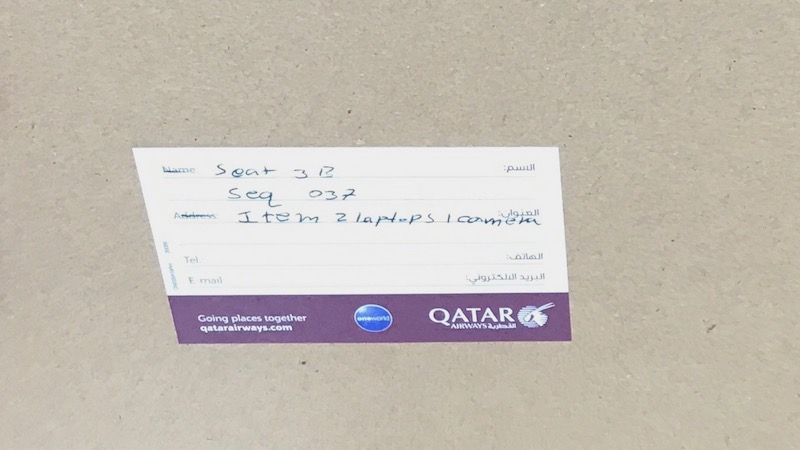

Once the items were packed in bubble wrap they were carefully placed into a cardboard box which was also sealed and bore my information. Then the box was placed into a clear plastic bag, closed and sealed with a tamper-proof tie and handed back to me to put through the security process (scanner and x-ray belt) which I carried back to another checkin counter.
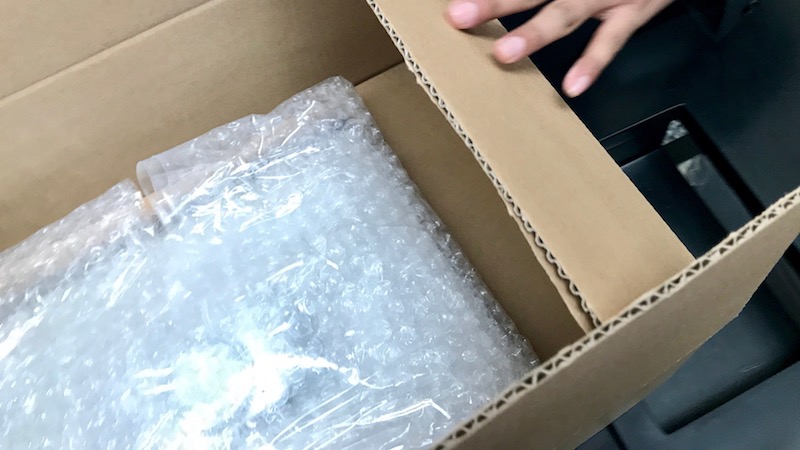
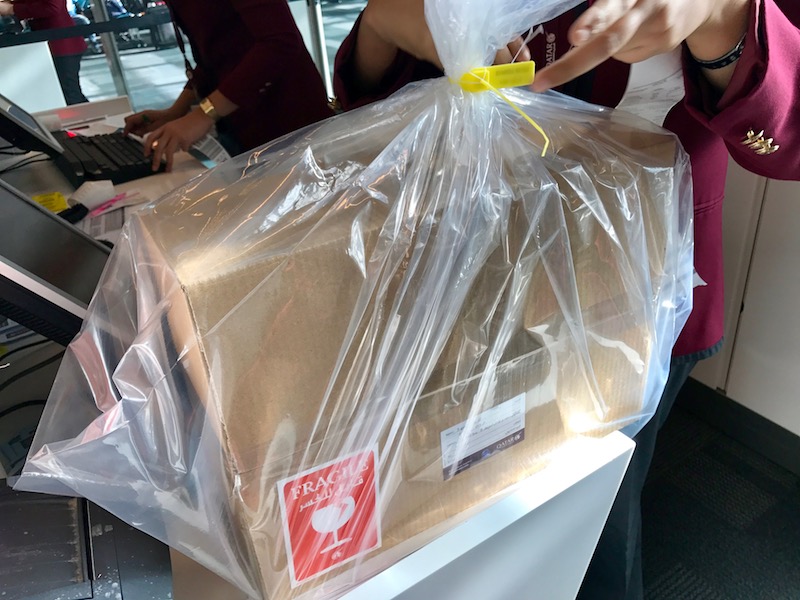
At the final checkin counter, my package was set behind the desk and an airline employee collected it and a few others and took them to the airplane to be loaded in plane’s cargo hold.
Lemonade
Qatar Airways offered HP Windows laptops with Microsoft’s Office suite and a power adapter onboard. In fact, I typed most of this review on that laptop. There were (8) laptops available for passengers who may request them which seemed like a very low number given the amount of business class seats on the flight. I was instructed to use a flash drive to save anything I had worked on, and make certain to delete it from the computer before turning it back in. I was also asked to keep the laptop charging the entire time I had it in use so it would be ready for the next passenger.
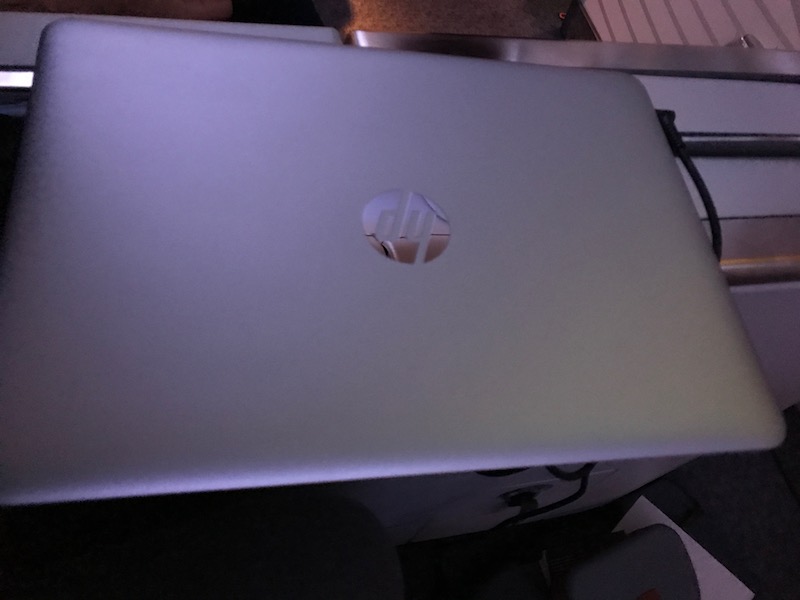
While I was hoping to be able to login via wifi and work online, my aircraft was not equipped with service and I had to transfer via the USB stick, however, this is a minor inconvenience of their process. I did not explore additional software on the devices as I wanted to limit my time and make the unit available for another passenger.
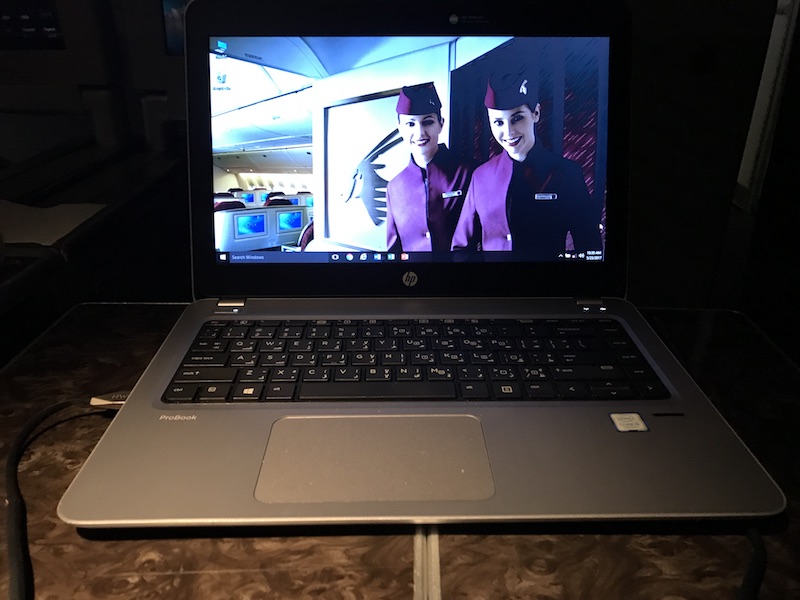
Collection
Upon landing at LAX and clearing customs I followed signs for my flight’s checked luggage and true to form there was a desk with staff members waiting to distribute property back to their owners staff members seemed completely unprepared.
As you might imagine, there was a substantial number of computers to return to their owners but the process seemed a surprisingly unorganized. The cardboard boxes (still in their sealed bags) came off the plane first but were sent through the normal process of conveyor belt to baggage carousel. I had assumed that kind of result from a US carrier, but after the level of care Qatar Airways had put into every other aspect of my experience I was utterly shocked that my equipment was treated as just any other box. I would have expected a cart to be rolled around from perhaps the oversized baggage claim belt with all of the boxes in order of seat numbers (there were no names on the boxes themselves).
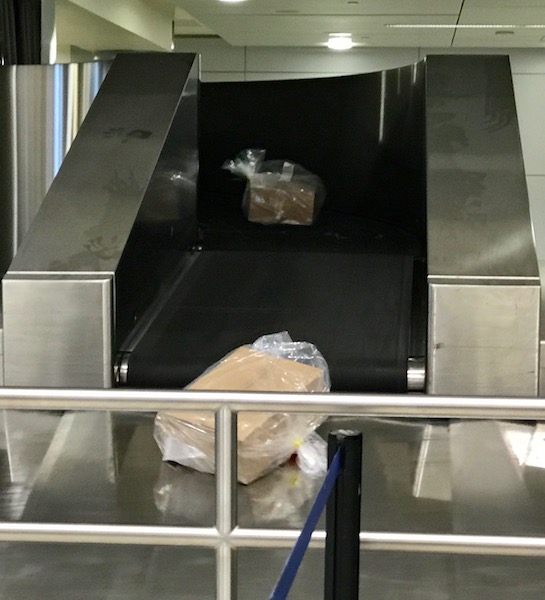
As the baggage claim area began to fill up, more and more brown boxes dropped to the carousel and were collected by staff but set on the ground and slid to an undefined area. Though I was able to retrieve my own bag and box, and though I don’t know of anyone who has had a box go missing – it wouldn’t have been hard to steal one. There was simply too much chaos and too many people and items moving around to be sure.
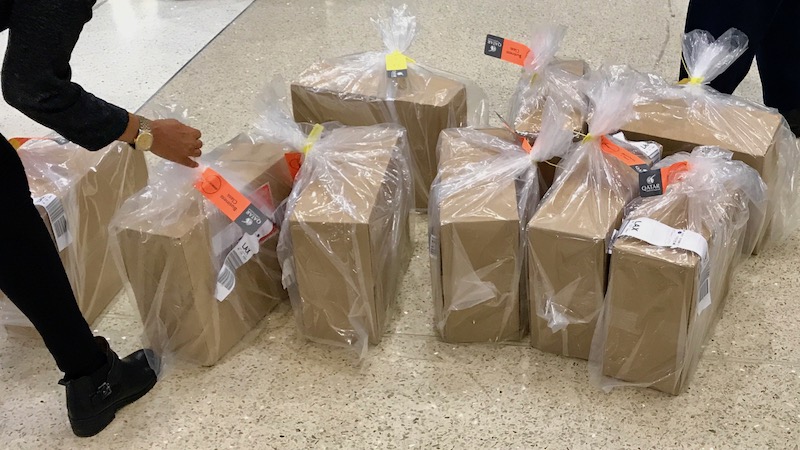
Once a little more organization was provided, an employee took out a manifest compiled of those who had turned in their laptops, what seat they were in, their name and their baggage claim number (given when it was turned in at Doha). Instead of waiting, I like others looked for their own box, found it, and a man approached me with the list, verified it was mine and had me sign a disclosure form to say that I had collected it.

However, I could have just as easily grabbed one and walked away while they were still unloading (mine or otherwise). In fact, before I even left the baggage area (waiting for one more checked item), I had already opened, unwrapped and loaded my equipment into my backpack and could have left the box on the ground or discarded it elsewhere.
My intent is not to show how to steal someone’s laptop box but rather to say that for all of the care that went into the initial effort in Doha, the destination was an unorganized disaster. I spoke with one other passenger who had checked their laptop in right before me in Doha and walked out ahead of me by a few feet. Her sentiments were a little stronger than mine, but she was most concerned with the lack of a well-formed process.
“They’ve had months to come up with something better than this. The ban went into effect in March and it’s our country’s fault, but after two months you would think they would have something better in place. I expect more from Qatar.”
For me, the process demonstrated so much attention to detail at the time of loading, but at collection it was all for nothing. The boxes were not categorized in any particular way which made checking for the rightful owners and locating the packages difficult and time-consuming but the lack of protection of the assets from potentially nefarious characters is simply inexcusable. Had they been organized by seat number (as they were most clearly labeled on the outside of the package) and then distributed as such, the process could have been far easier.
How Was It?
The process was fairly smooth and allowed me to use my laptop during my previous flight and on my layover in Doha instead of checking it into the cargo hold from my departure city. Wrapping and packing equipment could have smoother, and the labels weren’t as big and clear as would have made me feel comfortable – they were hand written – however, it went as well as it could have gone in Doha. At the collection point, things could have been better organized but at the end of the day I left with my laptops in good working condition, damage-free and relatively quickly.
Some have said that Trump handed the middle east carriers lemons but in the case of Qatar Airways, they simply made lemonade. Lemonade that still needs a little work, however.




The one giving lemons didn’t like that Qatar turn ot into lemonades, so they sabotage the lemonade-making process at the very end, which is their turf. It simply confirming that the ban was never about security. Well, its ME3 fault anyway, for taking US citizen’s job and other via good service and price of their carriers….
@James – Your sentiments certainly echo that which I heard from other Middle East based passengers. However, that theory gets thrown out the window if the US government implements an electronics ban to either Europe or flights departing the US. Both of those additional bans are being considered according to reports. In fact, the EU bans were so far down the fairway that Delta rolled out signs announcing the new DHS policy a couple of weeks ago.
How incredibly wasteful – all the boxes, bubble wrap, and plastic for what amounts to theater.
@Chris – I couldn’t agree more with the waste comment. I was wondering why they didn’t use a case like some airlines do in the business class cabin for tablets or noise canceling headphones. They could have easily fit all of the laptops in those slotted cases and secure that below instead, reusing the same one every time. Additionally, they would be able to control all of the assets in one place and form a line to check them back out to customers.
In Boston on my recent QR flight they brought them out on a cart and piled them on a table and checked receipts before they let anyone take any. It was a long slow process but very secure. They had scissors to cut the bags and boxes and bubble wrap open for us, which they did for us, allowing us to lose our stuff back into our backpacks and laptop bags.
I was the only one in the biz cabin to use a borrowed laptop.
@Hans – It sounds like the process was more organized in Boston than it was in LA. They did check the paperwork in LA, I want to make that clear, but the area was completely unprotected and it would not have been hard to lose an item. As far as I know, I was the only user of a laptop in business class as well.
It seems that a potential terrorist will now have his/her’s laptop blow up in the luggage belly of the plane as opposed to the passenger cabin. Yes, I understand the switch on and off prior to packing the laptops, but that does not necessarily mean that a bomb cannot be inside the laptop, or?? If the airport scanners cannot detect the bomb, why can’t you then just carry the bomb in your pant pockets?
@BJ – Presumably there are other ways to detonate an explosive if one so desired, but of course those explosives in a pocket would have to clear initial searches at the departing airport security and additional separate screening at the gate for US flights. Sadly, I presume that if a nefarious character could get explosives through security they would. I hope never to find out that they have.
I guess if we must have an electronics ban, the way QR/EK/TK/etc are handling it is a satisfactory alternative (though sounds like the ground service in LAX leaves something to be desired). The problem, of course, is when the ban is inevitably expanded to flights worldwide. I’d say there’s a roughly 0.0% chance that, say, AA will offer something like this. I doubt you’ll even see separated, protective baggage cases, or even gate checking. You’ll be told brusquely to put your laptop in your checked luggage at the counter. Oh, but baggage services will be there to cheerfully tell you they have zero responsibility for electronics when your laptop either doesn’t show up on the other end, or broken into a hundred pieces.
@MeanMeosh – You bring up a good point. The ME3 have to continue to offer some sort of extra service in order to minimize the damage done by the ban to their brand. However, if it expands to every carrier and every international flight then the response from US carriers would likely be the same as you have described (though we might see an initial exemption business and first class passengers). At which point the ME3 could either choose to keep their policy in place as it stands to differentiate themselves from the US carriers, or they could drop it to match expected US carrier action and save time, money and hassle. Like I said in the post, Qatar Airways got handed lemons and mostly made lemonade, they just need to refine the delivery method a bit at LAX.
Where is it written that airline passengers are entitled to take their laptop with them (either in the cabin, or in the belly of the plane), when they fly? What did they do (it wasn’t that long ago), when laptops were not in use? I don’t trust the TSA screeners, as they have been shown to be inept and incompetent in the past. Do we want a repeat of Pan American 103? Leave your laptops home; if you are going on a business trip, I’m sure that there will be laptops at your destination.
Not all of us have the luxury of just taking a day off from work.
Flew from DOH to JFK this morning – what a mess. Only 2 agents in Doha, completely disorganized process (Staff ran out of packing supplies – how is that even possible?) and electronics came out onto the belt in JFK like regular baggage with an agent responsible for putting them aside. But the agent couldn’t keep track of how many boxes had come off of the plane and wasn’t competent enough to organize the boxes in any sort of order which led to passengers just taking (presumably their own) boxes in a complete free for all.
Stark contrast to how Etihad handles the process (folding vs. taped boxes, clearly numbered boxes for easy retrieval, and all the electronics were loaded onto a valet cart in AUH and JFK as opposed to running them through the regular baggage handling system, not to mention sufficient and organized staff in JFK to return items to passengers, ticking each item off of a list).
I think overall Qatar has a better in-flight product but their handling of the electronics ban is beyond underwhelming for a carrier that is so focused on details.
@Joe – Between our experiences and the one of another reader, it sounds like so far only BOS has had a process in order. I’m surprised because I would think that JFK and LAX would be bigger markets for them (more staff, more experience, better planning, etc.)
I have to agree with you. I arrived last week at LAX with Qatar. The same thing happened.
I think the boarding and security procedure is rather chaotic but ok. But I could not believe that all our eletronic boxes were scattered over the floor near the baggage belt and people were freely walking in the middle of it.
But what happened is that we had to find our own box and go sign the paper. No one checked if I got the right box or if I was the the owner of it…
I think Turkish airlines does a better job by putting all the laptops in luggages and having someone from the company to open it and check each electronic individually